Four Must-Have Skills in Earth Data Science (According to Hiring Managers)
Earth analytics is a niche field that is growing rapidly. You may be considering a career in Earth analytics or looking for way to expand your Earth science expertise. What specific skills will give you a competitive edge in today’s job market? Uncover exactly what employers are looking for.
Why Are Earth Data Scientists in Demand?
Understanding earth systems is not solely a task for earth scientists. In today’s data-driven world, studying the earth requires interdisciplinary skills. Earth data science employers need trained earth scientists proficient in a range of data science skills. These skills include:
- Scientific programming
- Ability to find, integrate and manage data
- Ability to work in a collaborative, interdisciplinary team environment
A combination of data skills and interdisciplinary expertise is often difficult for employers to find, making Earth Data Scientists highly sought after in the workforce.
The increase in quantity and quality of data, particularly data about Earth, provide a robust and dynamic foundation for informing innovation in business, science and policy. It also provides opportunities to solve some of today’s most pressing environmental challenges.
What Earth Data Science Skills Are Employers Looking For?
Earth Lab conducted a survey of hiring managers in the field of Earth analytics. Learn more about the survey and high-level findings in Why Earth Data Science Skills Are In Demand: A Survey of Hiring Managers.
Here are four must-have skills to add to your repertoire if you are interested in a career in Earth analytics:
1. Learn How to Code
Just when you thought coding was only for computer nerds, it turns out Earth science expertise and programming are a match made in the cloud.
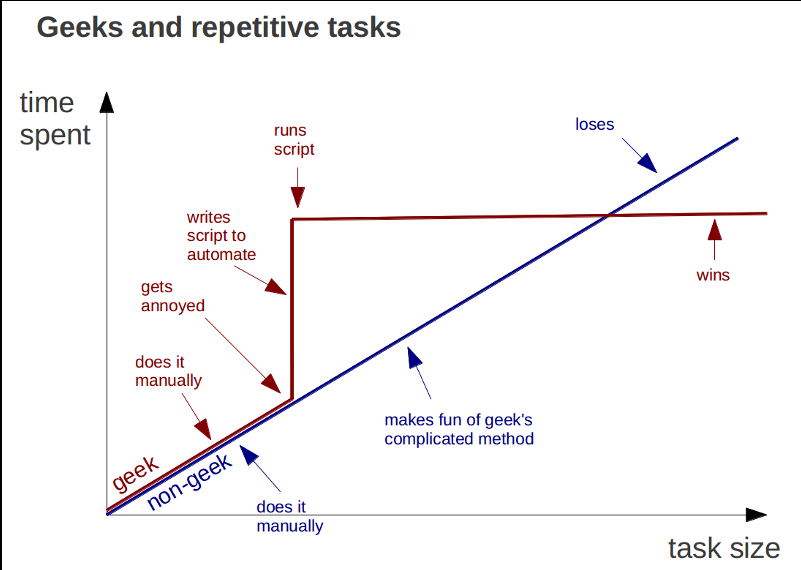
There are a wealth of career opportunities in data-intensive science and technology but you need to know how to code to take advantage of them. Here’s what real employers are saying about coding skills:
Coding Shows Data Skill Proficiency
Hiring managers ubiquitously emphasized the importance of coding as an indication of a job candidate’s ability to work with large data. One hiring manager stated that the following skills were the most important among potential job candidates:
Ability to write concise, readable scripts to answer scientific questions [and] preferably [be] familiar enough with software languages to shift to appropriate language for the problem.
Scientific programming is no longer a skill used just by software engineers, web developers and computer scientists. Rather, programming leads to workflow and data integration efficiency, automation, and beyond.
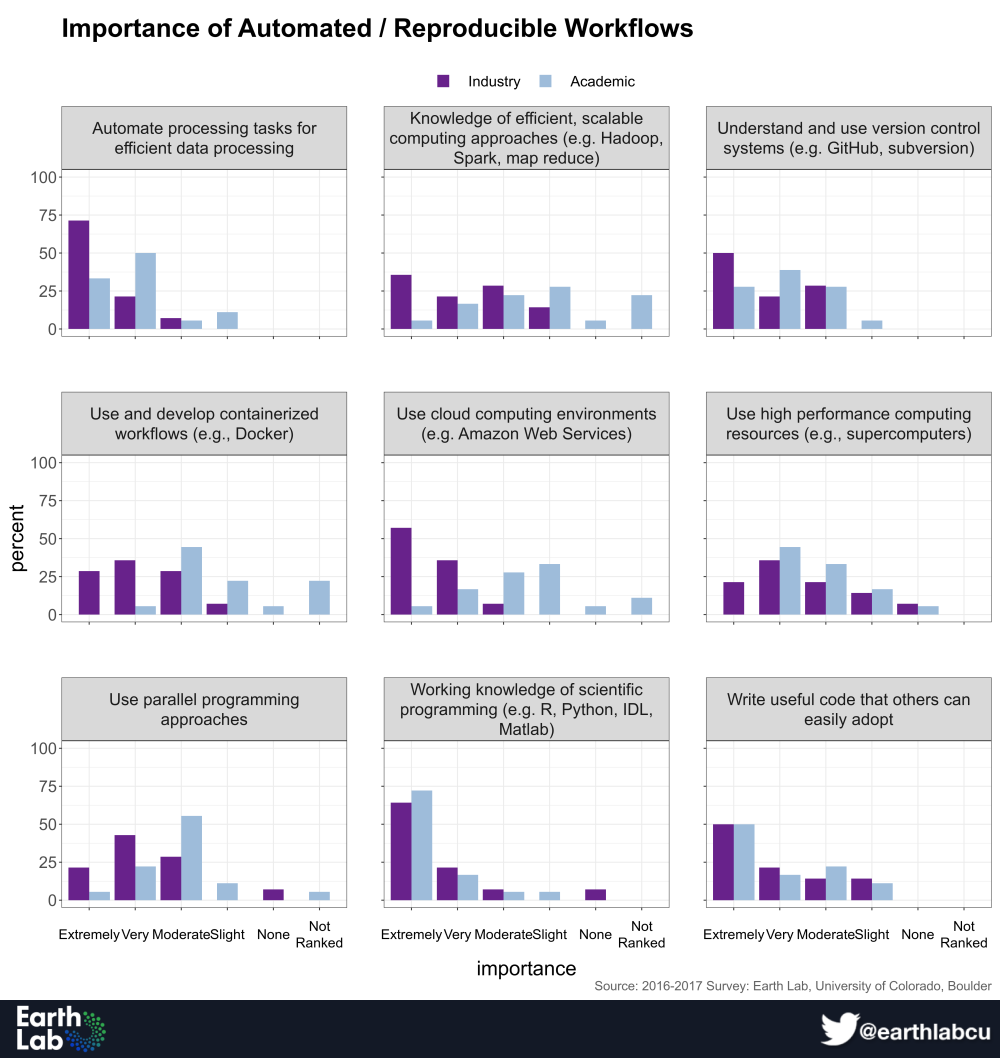
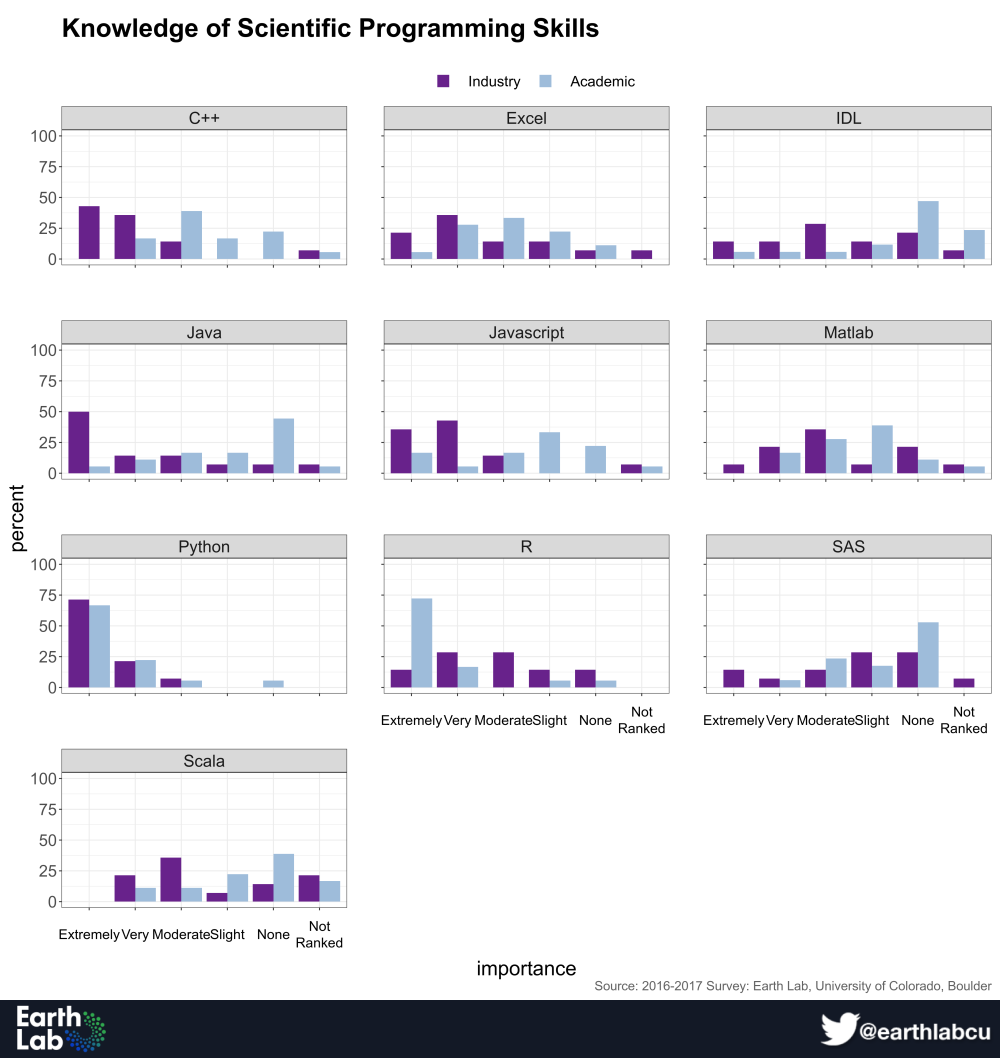
Knowing One Code Language Shows Your Capacity To Learn
Each coding language is unique and has its own strengths and weaknesses. Many employers generally look for proficiency in one language as an indication of capacity to learn and work with data. In many cases simply knowing one language well demonstrates an ability to learn other languages. One respondent noted:
I want to see fluency in one open scripting language (R or Python) and creative problem solving. The fluency in one language tells me that a candidate can learn another language.
Adaptability Is Valued Just As Much As Expertise
If becoming an expert in a coding language sounds daunting, fret not! Given that tools and programming languages evolve over time, being able to adapt and learn new things is often more important than being an expert. One hiring manager noted that the organization sought applicants who exhibited an:
Understanding of specific tools, but [were] flexible to adapt to others.
Failures Are Opportunities To Grow
Along these lines, another participant noted the importance of a positive attitude and desire to learn:
They need to be antifragile - not just resilient to failure, but grow through it. This is probably the hardest thing to screen and teach, but I believe examples can be set during the academic process that bring students to these skills.
No company expects candidates to be an expert at everything (or if they do, you probably don’t want to work for them!). Simply reaching a basic familiarity with coding will help you communicate effectively in interdisciplinary environments.
2. Know How to Manage Data
The ability to manage, integrate and process real data makes an average candidate exceptional. Here’s what real employers are saying about data management skills:
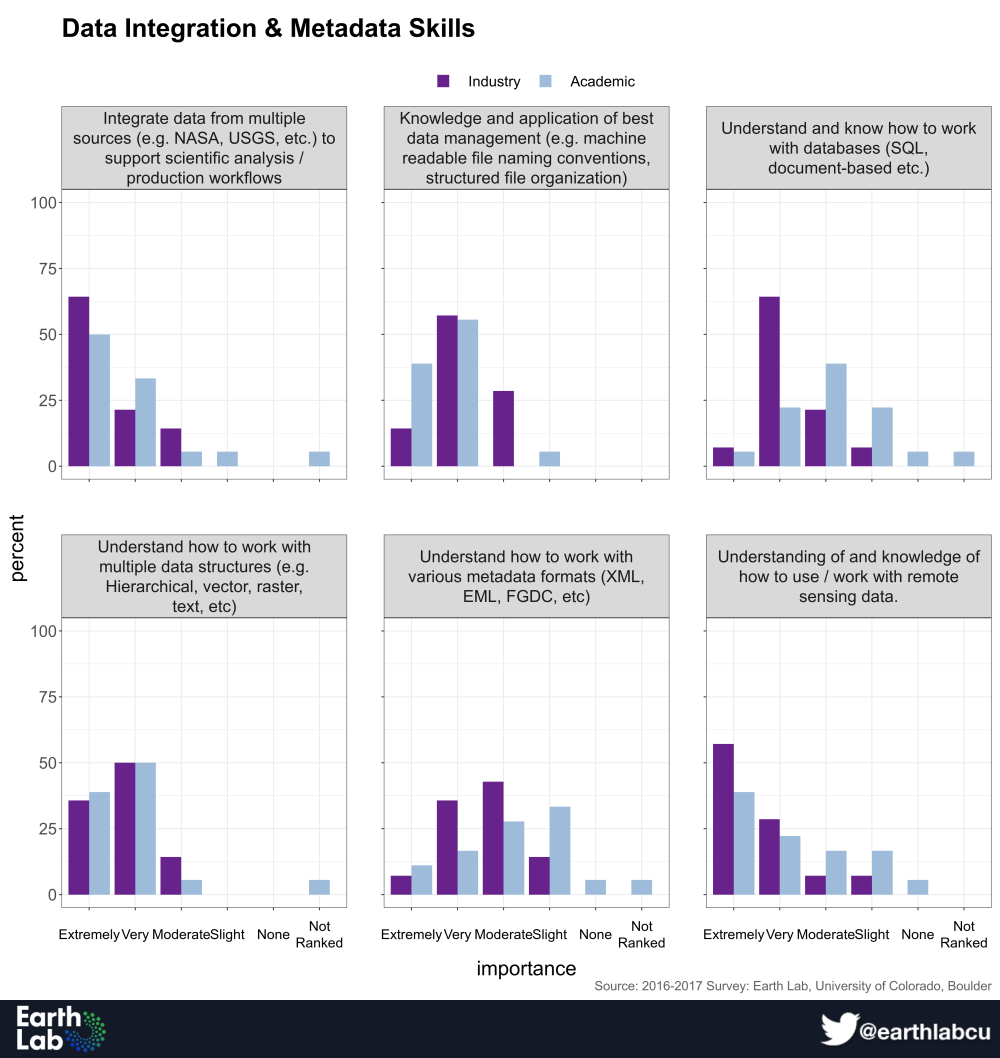
Learn How to Organize And Clean Up Data
Many potential employers emphasized that the ability to work with messy, real-world data was important. One hiring manager explained:
One of the most important issues we face is candidates who have not worked with real data. Many are very advanced in their statistics and programming knowledge, but haven’t had experience with data that haven’t been pre-cleaned, organized and described. Learning how to evaluate, understand/interpret and organize data to answer your research questions is critical.
Often, courses and workshops provide pre-cleaned data to students to optimize the teaching experience.
Want to be self-sufficient in data clean up? The Earth Analytics Course at Earth Lab teaches you how to clean up and organize your own data.
The reality of working with new data on a project is that many steps are required to clean or munge the data into a usable format. And if you can harness the potential of nontraditional datasets, you will be considered exceptional on the job.
General Data Structure Skills Are Critical
Once you know how to code, there are some specific data management skills that may significantly strengthen your professional credentials. In the survey, industry (AKA the private sector) and academic hiring managers preferred candidates that knew how to:
- Integrate data from multiple sources
- Work with different data structures (e.g. vector, raster, hierarchical)
- Employ best data management practices
- Work with remote sensing data.
3. Communicate and Collaborate Effectively
Welcome to the modern workplace: it’s professionally and geographically diverse. An ability to collaborate and communicate effectively, especially in interdisciplinary and remote-working environments, is extremely important to employers. Here’s what real employers are saying about communication and collaboration skills:
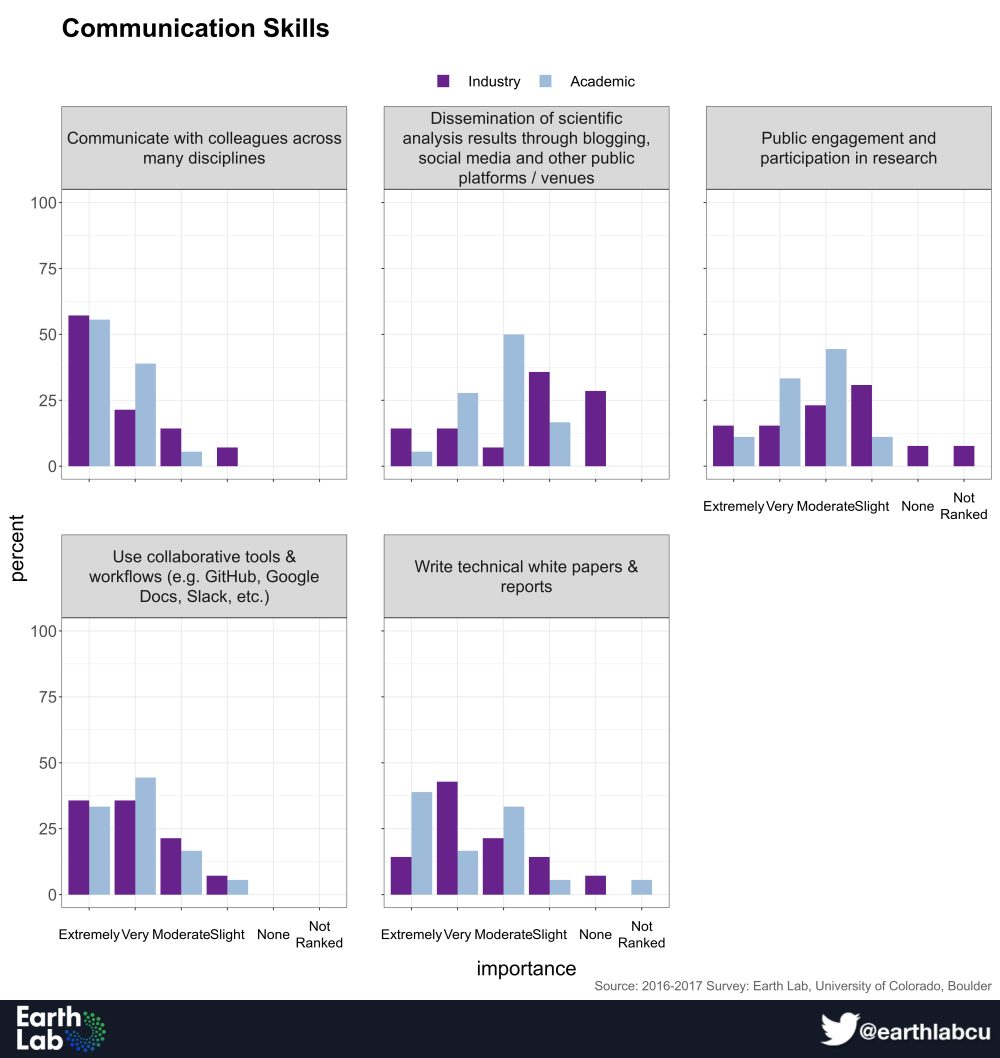
Communication Skills Are Highly Valued
The ability to communicate with colleagues across many disciplines was the most highly ranked communication skill in both industry and academia. As science and technology progress, scientists are asking bigger questions, making it impossible to remain in the realm of just one discipline. In a practical example, a steady increase in the number and discipline range of authors in academic research papers may indicate a need for interdisciplinary expertise, as noted in this article by The Economist.
Interdisciplinary roots will help grow your career and influence.
The private sector seeks interdisciplinary experience as working teams often contain an array of professionals. From engineers to project managers to sales staff, all parties need to be able to communicate with one another. One respondent noted:
I also want someone who can speak broadly about the industry and its challenges, not just repeat textbook examples or show code they’ve developed in a class.
Know How To Communicate and Collaborate Remotely
As remote work becomes more prevalent, the ability to use collaborative tools and workflows, as well as to communicate without being face-to-face is increasingly important. Companies are using tools like Slack for messaging, Google Docs for collaborative group writing and GitHub for version control, collaboration and sharing of code. It’s important that employees can pick up on these skills quickly. One hiring manager expects candidates to be:
Able to work independently and on a (distributed) agile team [with] strong real-time (voice/video) and non-real-time communication (tickets, email) experience.
Code Sharing Capabilities
The ability to create reproducible science and code is also very important. Job-seekers must know how to code in a way that can be documented and shared. In academia, results and data methodology need to be published. Also, authors who keep their data open to the public may achieve a higher number of citations in research papers.
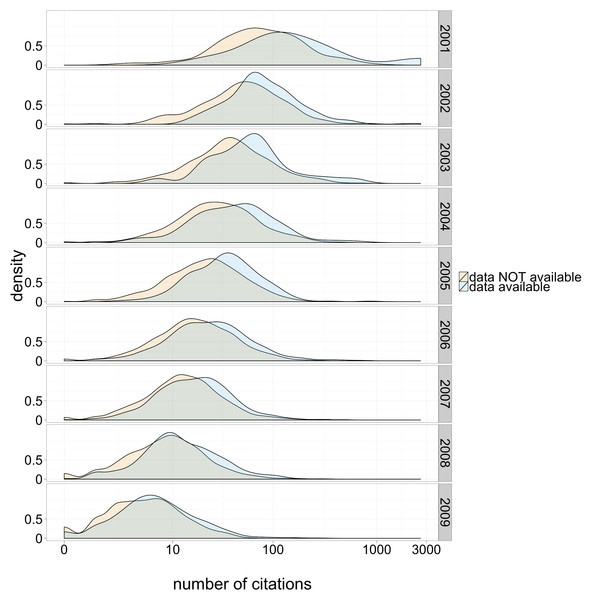
4. You Believe in Earth Data Science for the Greater Good
You’re right. This isn’t exactly a skill, but it is a highly valued characteristic. Your intentions and integrity in the field may be just as important as your expertise. While this may be a more obvious qualification in academia, industry participants also echoed this sentiment. One academic respondent explained that his/her organization looks for applicants who exhibit:
The ability to understand and demonstrate that science is not to be hoarded by yourself and your peers but is of interest to all people. The goal is to have the ability to easily communicate the nature, importance and goal of your research, such that any person can understand, appreciate and begin to communicate with others the message you deliver.
An industry respondent emphasized a desire to hire candidates who can see the big picture, stating that his/her organization looks for applicants who show:
A focus on collaborative open-source development, as well as producing these results in a scalable way. I think most scientists struggle when faced with two questions around something they’ve built:
- What is the value proposition to our customers (e.g. what job does this do for them that they’re trying to do elsewhere and how does this make it easier for them to do that job)?
- How does it scale (e.g. can anyone other than you run this code, or is it so complex and so narrow in scope that no one can use it)? Usability often trumps accuracy in industry
While there are sometimes limitations to making science open and reproducible, particularly in the private sector, the importance of open scientific methods is not lost among hiring managers.
Build Meaningful Career Opportunities With Earth Data Science Skills
Proficiency in data science can open up lots of academic and private sector job opportunities. Through teaching data science skills in the Earth sciences, the Earth Analytics Education Initiative, part of the CU-Boulder Earth Lab helps:
- Earth science students enter the workforce equipped, inspired and prepared to address pressing challenges.
- Earth science professionals adapt to changing workplace demands.
What skills have you found to be most important in your job search, current position, or organization? Comment below.
Interested in learning more about Earth analytics? The University of Colorado - Boulder, Earth Lab offers a professional graduate certificate in Earth Data Analytics - Foundations. Learn more here.
Share on
Twitter Facebook Google+ LinkedIn
Leave a Comment